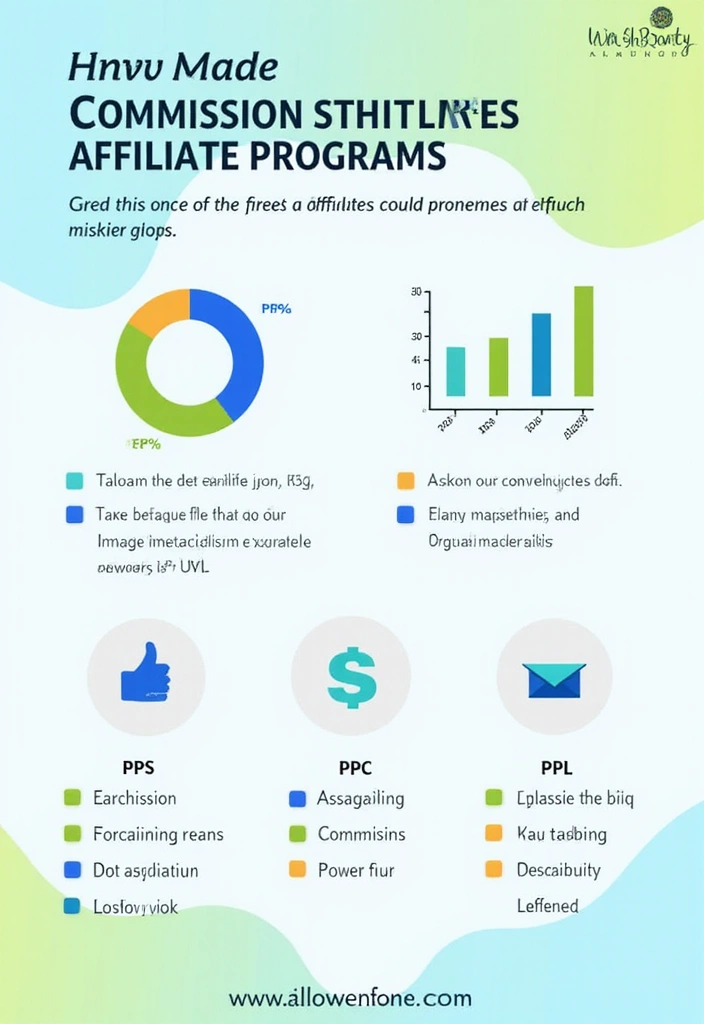Finding the right affiliate programs can be like searching for treasure in a vast ocean. With so many options available, it’s easy to feel overwhelmed. This guide will help you navigate through the waters of affiliate marketing, revealing insider tips and reviews to help you select the best programs for your needs.
From understanding commission structures to evaluating the support offered by affiliate networks, we’ll cover essential elements that can make or break your success. Let’s set sail on this journey to affiliate riches and discover what it takes to thrive in the affiliate marketing world!
Understanding Commission Structures

When selecting affiliate programs, it’s essential to grasp the various commission structures available. Programs typically offer commission types such as pay-per-sale (PPS), pay-per-click (PPC), and pay-per-lead (PPL). Understanding which structure aligns with your specific goals can greatly influence your potential earnings.
For instance, if your platform generates substantial traffic but struggles with conversions, opting for a PPC Advertising Guide might be a smart choice. Conversely, if you excel at selling products, a PPS model could provide you with higher returns.
It’s important to analyze these commission structures thoroughly. Look for affiliate programs that not only offer competitive rates but also feature opportunities for recurring commissions. A tiered commission structure can motivate you to promote products more actively, ultimately boosting your overall income.
Always remember to read the fine print; some programs have cookie durations that can significantly impact your earnings. Additionally, considering the reputation of the merchant is vital, as reputable brands typically lead to higher conversion rates and foster loyal customers.
To enhance your affiliate marketing efforts, consider utilizing resources like the Affiliate Marketing Strategy Guide and the Income Report Template to streamline your strategies and track your progress effectively.
Here are some tips to keep in mind:
– Understand your audience and their preferences.
– Experiment with different programs to identify the ones that perform best for you.
– Stay informed about any changes in commission structures to optimize your earnings.
Researching Affiliate Program Reviews

Before committing to an affiliate program, conducting thorough research on reviews is crucial. Affiliate program evaluations can offer valuable insights into the experiences of fellow marketers, helping you navigate potential pitfalls.
Start by visiting trusted review sites or forums where marketers openly share their opinions. Look for comprehensive reviews that address key aspects like ease of use, payouts, customer support, and product quality. For those looking to deepen their knowledge, consider enrolling in an Affiliate Marketing Course that can provide foundational insights into evaluating programs effectively.
As you analyze reviews, watch for red flags. If numerous users report payment issues or poor communication, it may be prudent to avoid that program. On the other hand, consistent positive feedback about timely payouts and attentive support is a good indication of reliability. Don’t rely solely on one source; gather information from various platforms to form a well-rounded perspective. Engaging with affiliate marketing communities can also be beneficial, allowing you to ask questions and share experiences, which may lead to discovering hidden gems in the affiliate world.
Additionally, using social media can help you gauge what people are saying about specific programs. Following affiliate marketing blogs for expert opinions can further enhance your understanding. You might also want to consider tools like Review Management Software to better analyze feedback. Lastly, comparing reviews across different platforms can help identify patterns or common themes, making your research even more effective. For those interested in blogging, utilizing Blogging Tools for Affiliate Marketing can also enhance your strategy and content creation efforts.
Evaluating Support and Resources

The support and resources offered by an affiliate program can play a crucial role in determining your success as an affiliate marketer. Programs that feature comprehensive training materials, effective marketing tools, and responsive customer service are invaluable assets. Consider investing in an Affiliate Marketing Resources Bundle to enhance your knowledge and skills, as it can provide you with the foundational knowledge necessary to thrive.
When assessing affiliate programs, be sure to find out if they offer tutorials, webinars, or even a dedicated affiliate manager. These resources are instrumental in helping you navigate challenges and refine your marketing strategies. Additionally, utilizing a Webinar Hosting Platform can facilitate your learning and engagement with the community, allowing you to stay informed about best practices.
Moreover, look for programs that supply ready-to-use marketing materials such as banners, email templates, and social media posts. This can save you considerable time and effort, enabling you to concentrate on driving traffic and increasing conversions. A robust support system is essential; quick response times and helpful assistance can greatly alleviate issues when they arise. Always read testimonials regarding their support to assess their reliability.
Here are some tips to keep in mind: seek out affiliate programs that prioritize training and community support, don’t hesitate to reach out to their support team with questions before joining, and consider using Graphic Design Software for Creatives to create compelling visuals that resonate with your audience. Joining webinars or community forums can also help you stay updated on the latest trends and strategies in the affiliate marketing landscape.
Identifying Your Niche

Choosing the right niche is a pivotal step in your affiliate marketing journey. It’s crucial to select a niche that not only captivates your interest but also demonstrates significant market demand. A clearly defined niche can draw a targeted audience, simplifying the process of effectively promoting products.
Begin by delving into your personal passions and areas of expertise. What subjects inspire you, and where do you possess substantial knowledge? To further refine your niche selection, utilize tools like Niche Research Toolkit to analyze market trends and identify areas with potential growth, while also assessing interest and competition.
It’s important to evaluate the profitability of your chosen niche. Some niches may exhibit high demand but offer low commission rates, whereas others could be less popular yet provide lucrative payouts. Striking the right balance is essential for achieving sustainable earnings. Consider employing Market Analysis Software to assist you in this evaluation.
After identifying your niche, concentrate on building authority by producing valuable content. This strategy will help establish trust with your audience, ultimately enhancing your conversion rates. To aid your content creation, consider investing in a Blogging Essentials Kit that provides you with necessary tools and resources.
Here are a few additional tips for selecting your niche:
– Experiment with different niches to ascertain which yields the most engagement.
– Stay informed about trends and shifts in consumer interests.
– Don’t hesitate to pivot if you uncover more promising opportunities.
Analyzing Product Quality

The quality of the products you choose to promote is crucial for your success as an affiliate marketer. High-quality products not only enhance your credibility but also lead to better conversion rates. To start, consider using product testing tools that allow you to experience the items firsthand. Your genuine reviews and recommendations can significantly impact your audience’s purchasing decisions.
If testing every product isn’t feasible, delve into customer reviews and ratings to assess quality. Additionally, take the brand’s reputation into account; well-established brands often come with built-in trust, making promotion easier. However, don’t overlook innovative offerings from lesser-known brands that fulfill specific customer needs.
It’s also essential to evaluate the customer support provided by the brand. A strong support system can lead to satisfied customers and encourage repeat sales. Furthermore, always check the return policy—customer-friendly return options can instill confidence in potential buyers.
For those looking to enhance their promotional skills, consider using a review writing guide to craft compelling content. Additionally, employing brand reputation management software can help you monitor feedback and complaints effectively.
Here are some key insights for evaluating product quality: keep an eye on customer feedback, focus on products that address specific audience problems, and prioritize ethical and sustainable choices in your promotions.
Assessing Payment Terms

Understanding the payment terms of an affiliate program is crucial for effective financial management. The variability in payment schedules, minimum payout thresholds, and payment methods can significantly impact your earnings.
Before committing to a program, take the time to thoroughly review the payment terms. Some programs offer monthly payouts, while others may distribute earnings bi-weekly or even quarterly. Knowing when you can expect your funds will enable you to plan your finances more effectively.
Additionally, minimum payout thresholds are a vital consideration. Programs with high thresholds can postpone your earnings, particularly when you’re just starting out. It’s advisable to seek programs with lower minimum thresholds, as this allows for more frequent payments. To manage your earnings efficiently, consider utilizing finance management tools to track your income and ensure you’re on top of your finances.
Moreover, the payment methods offered can also vary. Some affiliate programs provide direct bank transfers, while others utilize PayPal or checks. Opt for a payment method that suits your lifestyle, ensuring that accessing your earnings is hassle-free. For better organization, you might find payment tracking software useful, as it can help you keep a record of your earnings and payment dates.
Lastly, consider downloading budgeting apps to better understand any fees associated with your chosen payment method and to monitor your overall financial health. Researching the program’s history of timely payments will also provide peace of mind as you embark on your affiliate marketing journey.
Building Relationships with Merchants

Building strong relationships with merchants can significantly enhance your affiliate marketing success. Establishing a good rapport can lead to better support, exclusive offers, and even higher commissions.
To start, engage in open communication with merchants. Don’t hesitate to ask about their products, promotional strategies, or upcoming campaigns, as this demonstrates your interest in promoting their brand. You might also consider utilizing resources like the Networking Tips Guide to improve your networking skills and approach.
Participating in affiliate manager webinars or joining affiliate marketing forums can also help you network with fellow marketers and merchants. These connections often provide valuable insights and collaboration opportunities. Additionally, sharing your successes with merchants can be beneficial; highlight how their products have performed on your platform to showcase your value as an affiliate.
Remember to maintain professionalism in all communications. Timely responses and a friendly tone can foster lasting relationships. To boost your skills further, consider attending a Communication Skills Workshop to enhance your interaction abilities.
Here are some practical tips for nurturing relationships with merchants: Attend industry conferences and events to meet merchants face-to-face, and don’t forget to share constructive feedback about their products and services. Keeping in touch regularly, even when there are no promotions, is vital for maintaining a strong partnership. Lastly, stay updated with the latest trends by utilizing an Affiliate Marketing Events Calendar to ensure you don’t miss any crucial networking opportunities.
Utilizing Social Media for Promotion

Social media platforms serve as powerful channels for promoting affiliate programs, offering access to billions of potential customers globally. To effectively reach your target audience, start by identifying which platforms resonate most with them. For example, visual products often thrive on platforms like Instagram and Pinterest, while Facebook excels at fostering community engagement.
To maximize your promotional efforts, create captivating content that highlights the advantages of the products you endorse. Incorporate eye-catching images, engaging videos, and compelling stories to draw in your audience. Consider running contests or giveaways to boost interaction and broaden your reach. Utilizing tools like Social Media Management Tools can help streamline your efforts and enhance your overall strategy.
As you promote products, remember to utilize relevant hashtags and actively engage with your audience by responding to comments and messages. Cultivating a community centered around your niche can lead to increased conversions and a loyal follower base. Incorporate user-generated content to build trust and credibility, and don’t forget to analyze your social media metrics to fine-tune your strategies. Additionally, collaborating with influencers in your niche can significantly expand your reach. For those looking to enhance their marketing skills, consider recommending Content Creation Courses or utilizing Graphic Design Software for Marketing to create visually appealing promotional materials.
Creating Valuable Content

Creating valuable content is fundamental to achieving success in affiliate marketing. High-quality content not only attracts but also engages your audience, ultimately resulting in increased conversions.
To begin, take the time to understand the needs and interests of your audience. Utilizing tools like Content Creation Tools can help you produce engaging material that resonates with your readers. Conduct surveys or interact with your followers on social media to gather insights about their preferences. Once you’ve identified their questions and pain points, tailor your content to address these effectively.
Incorporate a variety of content formats, such as blog posts, videos, infographics, and podcasts, to cater to different audience preferences and expand your reach. Additionally, utilizing SEO Optimization Software is crucial for improving your content’s visibility online.
Make sure your content is both informative and entertaining, with a touch of authenticity. Sharing personal stories or experiences can significantly enhance relatability and foster trust with your audience. Naturally integrate your affiliate links within the content, ensuring readers can access relevant products without feeling overwhelmed by promotional material.
To further enhance your content creation process, consider investing in a Blogging Essentials Kit. Here are some additional tips for crafting valuable content: optimize for SEO, refresh outdated material to maintain relevance, and foster reader interaction with engaging questions or calls to action.
Tracking Your Performance

Tracking your performance is crucial in the realm of affiliate marketing. By understanding what strategies yield positive results and which ones fall short, you can fine-tune your approach and optimize your earnings.
Utilize powerful analytics tools to keep an eye on essential metrics like clicks, conversions, and the revenue generated from your affiliate links. Many affiliate programs offer user-friendly dashboards that display these performance metrics, making it easier for you to evaluate your efforts.
Establish clear objectives for your affiliate campaigns, whether it’s to increase traffic, enhance conversions, or expand your email subscriber list. Regularly assess your performance against these goals to pinpoint areas needing improvement.
Don’t shy away from experimenting with various promotional techniques or exploring new products. Utilizing tracking software for affiliates can help you analyze the impact of these changes, providing valuable insights into your audience’s preferences and behaviors.
Here are some tips for effective performance tracking:
– Develop a tracking spreadsheet to visualize your data effectively.
– Implement A/B testing to compare the efficacy of different strategies.
– Celebrate your successes while also taking time to learn from any setbacks, and consider consulting a performance measurement guide for additional insights.
Staying Updated on Industry Trends

The affiliate marketing landscape is in a constant state of flux, making it crucial for marketers to stay informed about the latest industry trends. Shifts in consumer behavior, advancements in technology, and evolving marketing strategies can significantly influence your success in this field.
To keep your knowledge sharp, consider subscribing to industry news subscriptions. These resources will deliver the latest updates directly to your inbox, ensuring you are always in the loop. Setting aside dedicated time each week to read relevant content will further enhance your understanding.
Listening to affiliate marketing podcasts is another great way to gain insights from industry experts, sparking inspiration for your campaigns. Participating in webinars and conferences can deepen your knowledge of emerging trends while also offering valuable networking opportunities with fellow marketers.
Additionally, you can explore conference tickets that provide access to industry thought leaders and innovative strategies. Finally, joining online communities where marketers share tips and experiences can serve as an excellent support network. By engaging with peers and learning from their insights, you’ll be better equipped to navigate the ever-changing landscape of affiliate marketing.
Utilizing Email Marketing

Email marketing stands out as a crucial strategy for affiliate marketers looking to build strong connections with their audience. By developing an email list, you can directly engage with subscribers, offering them valuable insights and product recommendations that resonate with their interests.
To kickstart your email marketing efforts, consider creating an enticing lead magnet, such as a free eBook or exclusive content, to drive sign-ups. Promoting your lead magnet on your website and social media platforms can significantly help in attracting subscribers. Utilizing lead generation tools can further optimize this process.
Once your list is established, it’s vital to nurture your subscribers through regular newsletters packed with useful content and affiliate promotions. Personalizing your emails can greatly enhance engagement and conversion rates. Don’t forget to leverage email marketing software to streamline your campaigns and maximize their effectiveness.
To ensure your emails resonate with your audience, track their performance using analytics. Experiment with different subject lines, content formats, and calls to action to refine your approach over time. Additionally, consider using newsletter templates to create visually appealing emails that capture attention.
Here are some effective email marketing tips to keep in mind:
– Segment your list based on subscriber interests for more targeted promotions.
– Keep your emails concise and visually engaging.
– Regularly clean your email list to maintain high engagement levels.
Understanding Legal and Ethical Considerations

Navigating the legal and ethical considerations of affiliate marketing is crucial for maintaining both credibility and compliance. Understanding the rules surrounding disclosures, copyright, and data privacy is not only essential for protecting yourself but also for safeguarding your audience’s interests.
To ensure adherence to the Federal Trade Commission (FTC) guidelines, it’s important to openly disclose your affiliate relationships. This level of transparency helps in building trust with your audience. For comprehensive guidance on navigating these legal complexities, consider investing in resources like Legal Guidance for Affiliate Marketers.
Familiarizing yourself with copyright laws is equally important, especially when it comes to using images, logos, and other content. Always seek permission or utilize royalty-free resources to avoid potential legal complications. For assistance in this area, Copyright Resources can provide valuable information.
Data privacy is another critical consideration. If you collect personal information from your audience, make sure to comply with regulations like GDPR. Prioritizing your audience’s privacy and security fosters trust and loyalty. To help you stay compliant, you might find Compliance Checklists to be a useful tool.
Here are some additional tips for successfully navigating legal and ethical considerations in affiliate marketing: Stay informed about changes in regulations that may affect your practices, consult legal professionals for clarity on compliance issues, and take the time to educate your audience about how their data is used.
Conclusion

Choosing the best affiliate programs requires careful consideration and research. By understanding commission structures, evaluating support, and creating valuable content, you can set yourself up for success in affiliate marketing.
Stay proactive by analyzing your performance and staying updated on industry trends. Building relationships with merchants and utilizing effective promotion strategies will further enhance your chances of success. Embrace the journey, and enjoy the rewards of affiliate marketing!
Note: We aim to provide accurate product links, but some may occasionally expire or become unavailable. If this happens, please search directly on Amazon for the product or a suitable alternative.
This post contains Amazon affiliate links, meaning I may earn a small commission if you purchase through my links, at no extra cost to you.
25 Budget-Friendly Mobile Home Landscaping Tips You’ll Wish You Knew Sooner!


